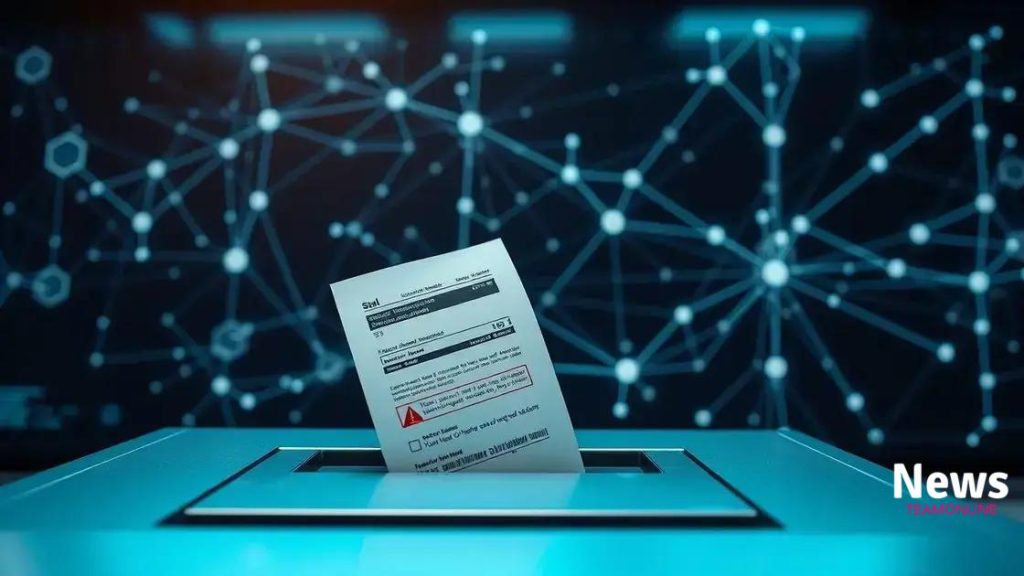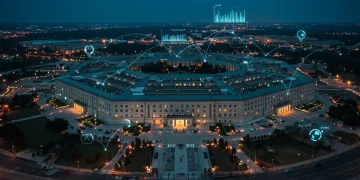The role of blockchain in ensuring election integrity

The role of blockchain in ensuring election integrity lies in its ability to provide secure, transparent, and immutable voting processes, thereby enhancing public trust and reducing the risk of fraud.
The role of blockchain in ensuring election integrity is gaining attention as a way to improve trust in democratic processes. Have you ever wondered how technology can secure votes and ensure transparency? Let’s delve into this intriguing topic.
Understanding blockchain technology
To grasp the importance of blockchain technology, it’s essential to understand its basic principles and operations. At its core, blockchain is a decentralized and distributed ledger that securely records transactions across multiple computers. This structure makes it nearly impossible to alter or hack the data, providing a high level of security.
Key Features of Blockchain
Blockchain has several features that make it unique and powerful. First, it is decentralized, meaning it is not controlled by a single entity. This reduces the risk of fraud and corruption. Second, every transaction is recorded in a block. Once a block is filled with transactions, it is added to the chain in a linear, chronological order.
- Transparency: Everyone can view the transactions, enhancing trust.
- Immutability: Once recorded, transactions cannot be changed or deleted.
- Security: Advanced cryptography protects the data from unauthorized access.
- Consensus Algorithms: Various methods ensure all participants agree on the validity of transactions.
Moreover, blockchain is designed to be tamper-proof. Each block contains a unique cryptographic hash of the previous block, linking them together. This link reinforces the integrity of the data since altering one block would require changing all subsequent blocks as well.
Real-World Applications
Many industries are exploring how to harness blockchain technology for various applications. For instance, in finance, it can streamline cross-border payments and reduce transaction fees significantly. In supply chain management, it can provide real-time tracking of goods as they move from one point to another, ensuring authenticity and reducing fraud.
In the context of elections, using blockchain could enhance voting security and ensure that votes are counted accurately. This can lead to greater public trust in the electoral process, as every transaction recorded on the blockchain is transparent and verifiable.
How blockchain enhances voting security
In today’s digital age, voting security is more important than ever. With concerns about fraud and the integrity of elections, blockchain technology offers a solution that can change the way we conduct votes. By utilizing blockchain, we can create a system where every vote is securely recorded and verifiable.
Transparency and Trust
One of the core advantages of blockchain in voting is its transparency. Every transaction, or vote, is recorded on a public ledger. This means that anyone can verify the results and the accuracy of the election process. Such transparency fosters trust among voters, knowing their votes are counted accurately and fairly.
- Real-time tracking: Voters can track their votes as they are counted.
- Auditable records: The immutable ledger allows for post-election audits.
- Voter anonymity: While votes are transparent, the identities of voters remain private.
- Reduced errors: Automation minimizes human errors in counting.
Additionally, the decentralized nature of blockchain makes it difficult for anyone to manipulate or tamper with the data. Since the blockchain is distributed across many computers, altering a single record requires changing multiple copies of the data. This makes election fraud significantly more challenging.
Smart Contracts in Voting
Another exciting feature of blockchain is the use of smart contracts. Smart contracts can automate various processes within the voting system, ensuring that rules and regulations are followed without the need for a mediator. For example, a smart contract could automatically validate a voter’s identity based on predefined criteria, further enhancing security.
As we explore these benefits, it’s clear that blockchain enhances voting security on multiple levels, ultimately leading to a more secure and trusted electoral process.
Real-world examples of blockchain in elections

Examining real-world examples of blockchain in elections reveals the technology’s potential to revolutionize how we conduct voting. Several countries and organizations are testing this innovative approach to ensure secure and transparent electoral processes.
Estonian e-Voting System
Estonia is a pioneer in the use of blockchain for e-voting. Since 2005, Estonia has allowed its citizens to vote online using a secure identity system. The ballots are encrypted, and blockchain technology ensures that votes remain immutable and verifiable. This system has increased voter participation and provided a model for other nations to consider.
- Security: Votes are encrypted and linked to a blockchain ledger.
- Transparency: Voters can verify their votes without compromising anonymity.
- Accessible: Citizens can vote from anywhere with an internet connection.
As a result, Estonia’s system demonstrates how blockchain can enhance trust and efficiency in elections.
Utah County, USA
Another example comes from Utah County, where officials piloted a blockchain-based voting solution for overseas voters during the 2020 election. Using this system, voters could submit their ballots through a secure application. The blockchain recorded each vote, ensuring that it could not be altered once cast. This pilot project aimed to improve access for military personnel and others who are away from their registered voting locations.
These real-world applications highlight the versatility and adaptability of blockchain in various electoral contexts. Many experts believe that as more evidence of successful implementation surfaces, we may see wider adoption of this technology in future elections.
Potential challenges and limitations
While adopting blockchain technology for elections presents exciting opportunities, it also comes with potential challenges and limitations. Understanding these issues is crucial for implementing effective voting systems.
Technological Infrastructure
The first challenge is related to technological infrastructure. Not all regions have equal access to the necessary technology, like reliable internet services or the devices needed for online voting. In areas with poor connectivity, implementing a blockchain voting system could be problematic.
- Access disparities: Some voters may struggle to access the necessary technology.
- Maintenance challenges: Ensuring all systems are up-to-date can be complex.
- Cybersecurity risks: As with any technology, there are concerns around hackers targeting voting systems.
These factors could inhibit the fair and widespread adoption of blockchain in elections.
Voter Awareness and Education
Another hurdle is the lack of awareness and understanding about blockchain technology among voters. For a successful transition to blockchain voting, voters need to understand how the system works and why it is secure. If individuals feel confused or uncertain, they may not trust the system, reducing participation.
Moreover, the complexity of blockchain can lead to misconceptions about its security and benefits. Educating the public is vital for building confidence in this new method of voting. Authorities must invest in outreach programs to explain how blockchain enhances the voting process and protects voter privacy.
Legal and Regulatory Issues
Lastly, there are legal and regulatory challenges associated with implementing blockchain in elections. Current voting laws may not accommodate digital voting systems, which could create confusion and hinder progress. Policymakers will need to adapt existing regulations to allow for blockchain voting while ensuring compliance with security measures.
The future of elections with blockchain
The future of elections looks promising with the integration of blockchain technology. As concerns about voting security and integrity increase, more countries are considering blockchain as a solution. This technology can potentially transform the voting process for the better.
Enhanced Security Features
One of the most significant advantages of using blockchain in elections is the enhanced security it provides. With blockchain, each vote is recorded on a decentralized ledger, making it nearly impossible to alter the information without detection. This level of security reduces the risk of fraud and increases public trust in the electoral process.
- Immutable records: Once a vote is cast, it cannot be changed or deleted.
- Real-time monitoring: Officials can monitor votes as they are cast, ensuring transparency.
- Voter anonymity: While the voting process is transparent, individual voter identities remain private.
As more people become aware of these features, we may see even greater acceptance and use of blockchain in future elections.
Inclusivity and Accessibility
Another important aspect of the future of elections with blockchain is its potential to enhance inclusivity. Blockchain technology allows for secure online voting, which can be particularly beneficial for those who face barriers to traditional voting methods. Accessible voting solutions can enable individuals, such as the disabled and overseas voters, to participate more fully in the democratic process.
As states adopt blockchain, we could witness a significant increase in voter turnout. By making the voting process more accessible, democracy becomes stronger. This could lead to a more engaged and representative electorate over time.
Global Adoption Trends
More countries are looking into blockchain for elections every year. Countries like Switzerland and Canada are exploring pilot projects to integrate blockchain into their voting systems. This growing trend indicates a potential shift toward a future where secure and transparent voting is the norm worldwide.
As innovative solutions emerge, the development of standards and regulations will also pave the way for successful implementation. The future of elections will likely be shaped by collaboration between governments, technology providers, and voters to leverage blockchain’s potential.
The future of elections is bright with the integration of blockchain technology. This secure and transparent approach has the potential to enhance voting security, improve accessibility, and increase public trust in the electoral process. As we explore examples from around the world, it’s clear that blockchain can make elections more inclusive and secure. While there are challenges to overcome, the benefits of using blockchain in elections far outweigh the drawbacks. With ongoing advancements and pilot projects, we are moving closer to a future where every vote truly counts.
FAQ – Questions about the Role of Blockchain in Elections
How does blockchain enhance voting security?
Blockchain enhances voting security by making votes immutable and easily verifiable, reducing the risk of tampering or fraud.
What are the accessibility benefits of blockchain voting?
Blockchain voting allows for online ballots, making it easier for people with disabilities or those living abroad to participate in elections.
How can blockchain increase public trust in elections?
The transparency of blockchain technology allows voters to verify their votes, which promotes trust in the electoral process.
Are any countries currently using blockchain for elections?
Yes, countries like Estonia and Canada are exploring and implementing blockchain technology to improve their electoral systems.





